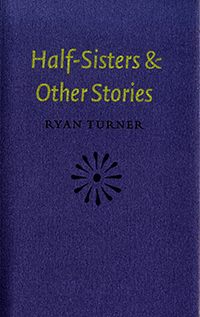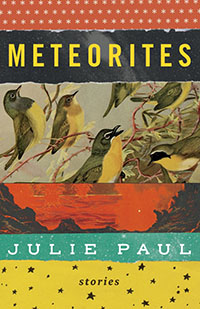Reviews
Fiction Reviews by Daniel Perry
Julie Paul, Meteorites (Victoria: Touchwood, 2019). Paperbound, 224 pp., $22.
Ryan Turner, Half-Sisters and Other Stories (Kentville: Gaspereau, 2019). Paperbound, 224 pp., $28.95.
 “There’s a strange pride a man takes in the place he calls home, as though its beauty is somehow his own creation,” says Lieutenant Grachev in “The Poet,” the longest story in Halifax author Ryan Turner’s second collection, Half-Sisters. Stationed hundreds of kilometres north of Moscow and in charge of reporting back on exiled prisoners, including
“There’s a strange pride a man takes in the place he calls home, as though its beauty is somehow his own creation,” says Lieutenant Grachev in “The Poet,” the longest story in Halifax author Ryan Turner’s second collection, Half-Sisters. Stationed hundreds of kilometres north of Moscow and in charge of reporting back on exiled prisoners, including
the poet Volotsky, Grachev encounters a famished, captured father and son, which leads him to turn his regard upon himself and his own
academic son, for whose departure to Canada the Muscovite Grachev was held responsible and is now in his own way exiled.
Geographically, northern Russia is the farthest Turner has travelled in either this book or What We’re Made Of, his 2010 ReLit-Award-shortlisted collection of linked stories told by a young writer named Benjamin, and while it’s in “The Poet” that he makes his most explicit statement about the theme of home, in the rest of the collection “home” lies in intimate relationships within families—in Atlantic Canada, yes, but in settings one could find elsewhere, too.
The first story, “Unusual Facts of Canadian History,” takes its title from a 1940s compendium read by the narrator, who goes by Ben/Benny and tells of growing up in New Brunswick with his paternal grandmother, who has a perhaps less than reliable memory, and Aunt Pamela, whose “past seemed full of dead ends, wrong turns.” The reader sees Ben[jamin]’s sensibilities maturing, however, as he comes to “crav[e] stories instead of what had once been the calming reassurance of closed-ended facts” and to ask “fewer questions about capital cities and historical dates and more about the people and places [he] passed every day.” Upon ultimately learning he’ll be moving to Halifax to live with his mother, closing this part of his past into memories,
the narrator returns to consider his grandmother’s past, “which was never safely fixed or forgotten[,] but awake to haunt and entertain her … [in] her own precarious world.” It’s a conclusion that, like the titular book, yokes the important and the banal, and calls attention to what’s to come: complex, character-driven stories of ordinary life, and not just Ben[jamin]’s this time. The seven stories that follow tell of different characters, and all in the third person.
In plumbing the depths of the ordinary, Turner produces stories that are anything but, imbued with quiet power and resonance. For example, in the title story, upon her mother’s death, Cora, one of three thirtysomething siblings—the one who has left the Maritimes for Toronto—locates their university student half-sibling, Louisa, in that city in order to notify their shared father. From this story of separating the real Louisa from the half-truths Cora’s mother has long told, the collection moves next to “Poses,” which in contrast focuses on the accumulation of details in cover stories that hide the aspects of a person they don’t want to show; one character is having an affair, another hasn’t yet come out to his mother.
“Poses” turns on the friendship of a woman who teaches an art class with the protagonist, Grant, whom she met when he began modelling nude for her students. When asked by a family member how modelling felt, Grant says,
“Strange. And then fine,” fine because he didn’t want to say freeing.
He’d never in his life wished to be the centre of attention, to have all eyes on him, and he told them how foreign and refreshing it was to be seen, to be really looked at with such discriminating attention.
All Turner’s home subjects in Half-Sisters could feel the same way: stripped naked, but seen intimately, free to be just who they are—and whose beauty is, somehow, the author’s creation.

All the way across the country, Victoria author Julie Paul’s third collection, Meteorites, comprises fourteen stories varying in subject matter but often examining intimate relationships, albeit less often in their active state than in the past and seen through the filter of the present.
“Barker’s Berries” follows an aspiring folk singer’s rethinking of her relationship to her ailing mother as she waits to perform thousands
of miles from the farm where she was raised. The ironic “Sleeping with Kittens” is in the form of a letter home, from a young woman completely absorbed in her new university life to her friend who, after becoming pregnant, didn’t get to go. “Trajectory” tells also of a highschool friendship, between two university-bound “geek girls,” ruptured on a field trip in which the narrator, Lori, sneaks off with a boy and, according to her friend, Sara, violates an agreement—an agreement not made or recounted in the story itself, leaving the reader to ask how exactly Lori breached it, and whether her actions were a selfish lapse or a deliberate choice to kill the friendship.
The field trip in “Trajectory” is to Massachusetts, and the offending act occurs inside the empty bus outside the Salem Witch Museum; during the make-out, the setting allows the boy to say, “The Devil’s gotten inside of you. But I know how to get him out.” It’s a clever conceit for a story of a puritanical woman turning on her friend— Sara, from a religious family, calls Lori a whore in the end—but also shows how sudden sex or violence can lie just beneath a relationship’s surface, a theme best realized in two of the book’s most powerful stories.
In “Spilling the Bees,” identical twin Joel, who fell out with his brother, Michael, after a trauma suffered decades ago, is surprised when his wife, Margo, invites Michael to visit. The brothers inch toward reconciliation, but throughout Joel becomes increasingly angry as Michael seems to pick up where he left off, trying to seduce Margo just as he had stolen several of Joel’s girlfriends since middle school.
Sudden violence also occurs in “Hangman,” one of four stories notably shorter than the others in the collection, when a father is murdered in a female co-worker’s house while his daughter and foster son wait in the car. The scene recalls “Walkers Brother Cowboy” (and note, the next story in the collection overtly references Alice Munro),
adding a cell phone and a gun, and instead of revealing the father’s secret to the children in the moment, Paul chooses the chilling, Sophoclean path, leaving the main horror to be reported back to the daughter and a second horror to be discovered by her later.
Baring the latent impulses of her characters is not the only thread Paul picks up from her preceding collection, The Pull of the Moon: the tendency toward the speculative seen in her story “Pilgrim” returns in “Accidental,” in which a woman tries to bring her missing brother home like a lost cat—first by leaving his favourite food outside, then upping the ante—and even more so in “The Expansion,” where a childless couple (“had the tests, tried for years and have the moolah”) moves to a utopian, planned island community and, as the flora and fauna and then the inhabitants suddenly grow to terrifying sizes, discovers an abandoned baby and settles in regardless.
In the concluding story, which provides the book’s title, a smalltown couple is deceived by new arrivals who try to befriend them only to surreptitiously write an article about them. Their ill-fated second evening together ends with the locals leading an initiation ritual in which new residents must swim in the freezing quarry, and the pretext for getting the newbies into the car is a search for a just-fallen meteorite. Paul’s characters may be less at or about home than Turner’s—as she writes of the twins Michael and Joel, several are “an experiment’s results right here and now: what happens … when variables change”—but they’re aptly collected under the title Meteorites, and worth study in whichever context they’ve landed.
—Daniel Perry









